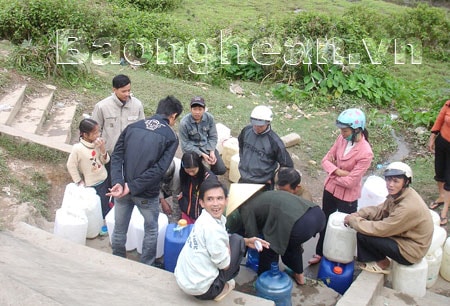Strengthening water resources management
(Baonghean) - Although there have been positive changes compared to before, the management, exploitation and use of water resources in our province still have many shortcomings.
Some projects exploit water sources without planning, without registration or permission; many facilities for drilling, exploring and exploiting underground water do not have licenses and have not been professionally and technically trained. Some production, business and craft villages have untreated wastewater according to regulations, over-exploitation without protection measures, and indiscriminate dumping of waste into rivers, lakes, canals, etc. are at risk of causing water sources to degrade, dry up and become polluted, affecting production, daily life and people's health.
Queuing up to get stream water in Khanh Son commune (Nam Dan)
In addition, the impact of climate change also leads to water shortages and declines, in addition to the pressure from population growth and socio-economic development. As the population increases and living standards improve, the demand for water for production and daily life increases. According to statistics from the Water Department - Department of Natural Resources and Environment, in the two years 2009 - 2010 alone, the number of households using clean water in the province increased from 610,000 households to 640,000 households. Not to mention the increasing use of water for industrial production, putting great pressure on water resources.
Meanwhile, financial resources for investment in water resources management at the local level are still limited. Therefore, state management of water resources is still scattered, overlapping, and unclear. For example, although the state management function has been transferred to the Natural Resources and Environment sector, in reality, the Agriculture sector manages water resources in agricultural production, the Construction sector manages water resources for domestic use...
Faced with the difficulties, to ensure good implementation of state management of water resources, it is necessary to promote propaganda to raise awareness and disseminate legal documents on water resources. Guide organizations, production and business establishments, households and individuals exploiting and using water resources, drilling for underground water, discharging wastewater to register, prepare documents to apply for operating and practicing licenses and submit them to competent authorities for decision.
It is necessary to strengthen inspection and handling of violations, apply stricter regulations on pollution control, and force all businesses - from small to large - to meet minimum standards.
In the long term, it is necessary to perfect institutions and policies on water resources management, develop implementation guidelines and amend and supplement them to perfect the system of legal documents on water resources.
Khanh Ly






